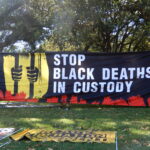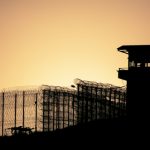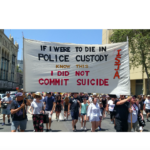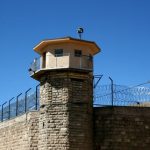Corrective Services Officers Strike Over Upgrading of Charges Against Colleague
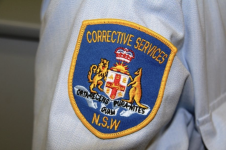
More than 5,000 New South Wales Corrective Services officers are on a 24-hour strike in protest over the upgrading of a colleague’s charges from manslaughter to murder following a review by the Office of Director of Public Prosecutions (DPP) into the shooting death of an Indigenous prison inmate.
The story so far
Dwayne Johnstone had been taken into custody on the morning of 15 March 2019, where he was denied police bail for assault charges.
He suffered from epilepsy and appeared to have a seizure in the cells at Lismore Local Court in the afternoon, so he was taken to hospital.
After receiving treatment, he attempted to escape custody while handcuffed and shackled.
The NSW Corrective Services officer accompanying Mr Johnstone, who cannot be named due to a court suppression order and is known only as ‘Officer A’, fired three shots at Mr Johnstone, one of which hit and killed him.
A Coronial Inquest was later conducted, the details of which have not been made public.
The Coroner’s findings and recommendations were then referred to the DPP.
Charge upgraded
The officer who shot Mr Johnstone was initially charged with manslaughter, but that charge will now be upgraded to murder after a DPP review of the evidence.
The DPP released the following statement in relation to the decision:
“All the available evidence in this matter, including newly subpoenaed material, has been reviewed in preparation for the upcoming trial”.
“The Director has determined that the appropriate charge is one of murder.”
Manslaughter versus murder
The offence of manslaughter can be defined as a homicide without the intention to kill, or a homicide without reckless indifference to human life.
Manslaughter is an offence under section 18(1)(b) of the Crimes Act 1900 which carries a maximum penalty of 25 years in prison.
The section makes clear that every punishable homicide other than murder is taken to be manslaughter.
There are at three broad categories of manslaughter in NSW:
- Manslaughter by unlawful and dangerous act,
- Manslaughter by criminal negligence, and
- Manslaughter by excessive self-defence.
The maximum penalty for the charge of manslaughter in New South Wales is 25 years’ imprisonment.
Murder is an offence under section 18 of the Crimes Act 1900 (NSW) which attracts a maximum penalty of life in prison.
The section states:
“Murder shall be taken to have been committed where the act of the accused, or thing by him or her omitted to be done, causing the death charged, was done or omitted with reckless indifference to human life, or with intent to kill or inflict grievous bodily harm upon some person, or done in an attempt to commit, or during or immediately after the commission, by the accused, or some accomplice with him or her.”
To establish the offence of murder, the prosecution must prove beyond reasonable doubt that the defendant:
- Caused the death of another person,
- Did so by way of a voluntary act or omission, and
- Did so with the intention to kill or inflict grievous bodily harm, or with reckless indifference to human life
Constructive murder, sometimes called ‘felony murder’, is where another person’s death occurred during or immediately after the defendant or an accomplice committed, or attempted to commit, a criminal offence punishable by a maximum penalty of at least 25 years in prison.
Such offences include:
- Robbery while armed with a dangerous weapon,
- Robbery with wounding, and
- Sexual intercourse with a child under 10 years.
Legal defence to murder
The legal defence that is available to a charge of murder is self-defence.
The law of self-defence is contained in section 418 of the Crimes Act 1900 (NSW).
The section states that a person is not criminally responsible for their actions if he or she believes they were carried out in self-defence, and the conduct is a reasonable response in the circumstances as he or she perceives them.
Self-defence is a complete defence, which means the person is entitled to be found not guilty for their actions.
The defence is available where the conduct is necessary to:
(a) defend himself or herself or another person, or
(b) prevent or terminate the unlawful deprivation of his or her liberty or the liberty of another person, or
(c) protect property from unlawful taking, destruction, damage or interference, or
(d) prevent criminal trespass to any land or premises or to remove a person committing any such criminal trespass.
This extends to the situation where a person steps in to defend another person against an assault.
However, section 420 of the Act makes clear that self-defence is not available where a person uses force that involves the intentional or reckless infliction of death only to protect property or prevent a trespass.
And section 421 provides that where a person uses excessive force to defend themselves or another, including to prevent the unlawful deprivation of liberty, and that force results in their target’s death, the person will be criminally responsible for manslaughter rather than murder provided that he or she believed the conduct was necessary in the circumstances.
Significantly, section 419 stipulates that if evidence of self-defence is raised, the prosecution must then prove beyond a reasonable doubt that the actions did not amount to self-defence. If the prosecution is unable to do this, the defendant must be acquitted.
NSW Corrective Services Strike
In response to the news of the upgraded charges, the Public Service Association (PSA) has announced that over 5,000 Corrective Services officers are on strike for a 24-hour period, supporting Officer’ A’ particularly seeking clarity around the use of firearms.
The PSA has defended the actions of the officer, saying that he has an “impeccable record” and that “Prison officers deployed with firearms in the expectation they may have to use them in an escape situation. If they are not to use weapons, they should not be deployed with them.”
In the 30 years since the Royal Commission into Aboriginal Deaths in Custody, the National Deaths in Custody Program has recorded 489 Indigenous deaths in custody, including 320 in prison, 165 in police custody or custody-related operations and 4 in youth detention.
No corrective services officer has ever been convicted over the death of an Indigenous person.


